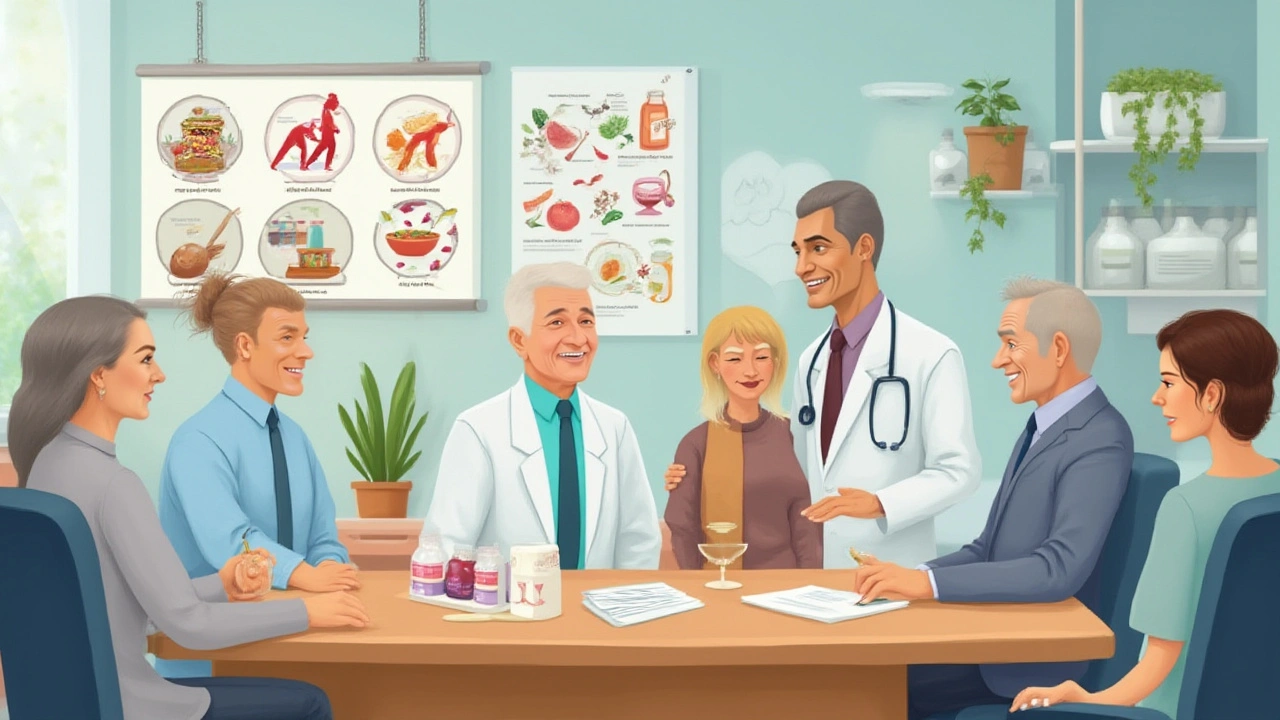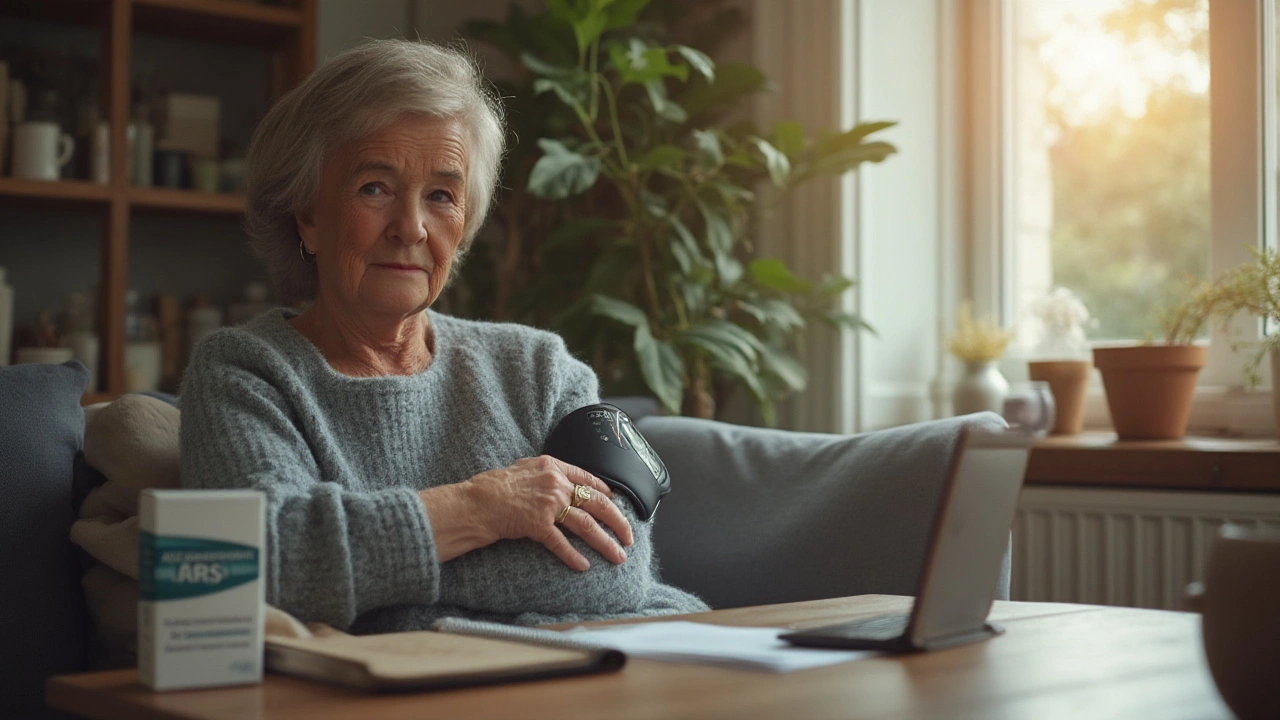If someone told you your heart could beat stronger without beta blockers, would you even believe it? For decades, these drugs have been go-to options for blood pressure, chest pain, and even a racing, panicky heart. Yet, not everyone gets along with them. Side effects like fatigue, cold fingers, and sometimes those weird vivid dreams make folks wonder—what else is out there?
Understanding Beta Blockers and Why People Seek Alternatives
Let’s get clear about what beta blockers even do. These meds work by blocking adrenaline's effect on the heart: they slow your pulse, lower blood pressure, and take the edge off those sweaty-palmed moments you dread at the dentist or during a stressful exam. Propranolol and metoprolol are names you might have heard during a visit to the pharmacy. Around the world, more than 40 million people take these drugs every day. But why look for a beta blocker alternative?
For some, it's about side effects. You might notice feeling sluggish, maybe even a bit blue, or your hands and feet are always icy—none of that makes your day better. Sometimes, beta blockers worsen conditions like asthma. The FDA even cautions people with severe lung disease not to use certain types. There’s also a big crowd that needs help managing anxiety or public speaking jitters but can’t handle the tiredness or brain fog.
Switching isn’t something you do on a whim. But real-world numbers show many people swap out beta blockers: in a study from a major cardiology group, about 1 out of 5 patients changed therapy within a year because of side effects. Plus, new research is showing that alternatives—both drug and non-drug—can work just as well or sometimes even better for certain issues. If you’re searching for a beta blocker alternative that fits you, turns out you’ve got choices.
Pharmacologic Alternatives: ACE Inhibitors, ARBs, and Calcium Channel Blockers
Doctors often recommend switching to a different type of medicine that tackles the same problems as beta blockers. The main players in this space are ACE inhibitors, ARBs, and calcium channel blockers. Each class gets at blood pressure and heart health in a unique way.
Let’s talk ACE inhibitors first. These meds—think lisinopril or enalapril—relax blood vessels and lower blood pressure by blocking an enzyme your body uses to tighten arteries. If you want to keep your heart pumping smoothly but hate the tiredness from beta blockers, this group is a good contender. Perks? Fewer issues with fatigue or mood, and no slowed-down heart rate. Bad news: up to 1 in 10 get a dry cough, and some experience a weird metallic taste. Still, studies consistently show ACE inhibitors cut your risk of heart attacks and stroke as well as beta blockers for people with hypertension.
Cousins to ACE inhibitors, ARBs (like losartan or valsartan), ditch the cough and still keep vessels relaxed. These are way less likely to bother your lungs or give weird side effects. For people with diabetes, they’re especially effective at protecting kidney function and reducing long-term risks.
Now, if you want your heart to take things easy, calcium channel blockers—like amlodipine or diltiazem—stop calcium from cranking up the pressure inside blood vessels. These meds work wonders at lowering blood pressure and keeping chest pain (angina) away. One bonus: they don’t make asthma worse, unlike beta blockers, and they won’t give you that exercise hangover.
Feeling lost in a forest of drug names? Here’s a quick breakdown:
| Alternative | Main Use | Common Side Effects |
|---|---|---|
| ACE Inhibitors | Blood pressure, heart failure | Dry cough, dizzy, rare swelling |
| ARBs | Blood pressure, kidney protection | Dizziness, rare angioedema |
| Calcium Channel Blockers | High blood pressure, chest pain | Swollen ankles, headache |
Notice one big win: none cause low mood or cold hands like beta blockers often do. Doctors might also mix two classes, say, an ACE inhibitor with a calcium channel blocker, to get the best of both worlds. Still, you need regular bloodwork to keep kidney function and electrolytes in check.
If you want to see a detailed rundown comparing even more alternatives, check out this straight-shooting guide to beta blocker alternative options. It breaks down the meds by benefits, risks, and who they’re best for—so you’re not just guessing what’s behind the pharmacy counter.

Natural and Lifestyle Solutions: From Yoga to Diet Tweaks
Maybe you want to avoid extra pills hanging around your nightstand. You’re not alone—almost 1 in 3 people with heart or blood pressure issues look into lifestyle swaps or natural therapies. And get this: some work better than you’d think, especially when anxiety or stress is a bigger worry than blood pressure alone.
Yoga isn’t just about tricky poses or Instagram-worthy balances. Regular yoga trims blood pressure numbers, tames a wild heart, and can even help control stress-induced palpitations. There’s a randomized study from India showing that three months of daily yoga dropped average systolic blood pressure by 8 points—about as much as some starting doses of blood pressure meds.
Meditation and deep breathing do real work too. Twenty minutes each day of mindful breathing shaved nearly 5 points off resting heart rates in folks dealing with chronic anxiety. Some people even call meditation their "mental beta blocker"—it dials down adrenaline and brings your body out of fight-or-flight mode, without pills.
Let’s talk food. The DASH diet (Dietary Approaches to Stop Hypertension) isn’t a fad—it’s meticulously researched. By loading up on leafy greens, nuts, and cutting down salt, systolic pressure can drop by up to 10 points in under two months for some. Bananas and spinach aren’t just healthy—they counteract salt's effect in your body by pumping up potassium, which directly relaxes your blood vessels.
Physical activity? It’s your hidden weapon. Brisk walks, cycling, even chasing your dog at the park all help your heart beat slower and smarter. Study after study says 150 minutes a week is the sweet spot: the American Heart Association found that just five 30-minute sessions per week lower stress hormones and improve vessel function about as well as low-dose meds.
Some supplements get hyped up, but only a few have data to back them. Omega-3 fatty acids (think: fish oil) reduce resting heart rate and are tied to fewer fatal heart arrhythmias. Magnesium supplements help some with muscle tension and palpitations, but ask your doc first, since too much can mess with kidney function.
If anxiety or performance stress is more your trouble than heart disease, non-drug skills matter. CBT (Cognitive Behavioral Therapy) slashes panic symptoms for more than 60% of sufferers. And simple tricks—like rehearsing tough speeches in front of a mirror, distraction with music, and positive visualization—take the edge off big moments when your heart would otherwise race.
Precision Strategies: Matching Therapies to Individual Needs
What really works depends on your situation. Doctors, patients, and researchers agree: the best beta blocker alternative is the one that fits your exact mix of health challenges, lifestyle, and preferences. Let’s lay out some checkboxes.
- High blood pressure with heart failure? ACE inhibitors or ARBs usually lead the pack, sometimes paired with a diuretic.
- Chronic chest pain but no asthma? Calcium channel blockers shine.
- Performance anxiety? Non-drug skills plus gentle activity (even a walk before big meetings) beat pills for many.
- Asthma, diabetes, or severe allergies? Skip beta blockers and stick with options that don’t mess with lungs or sugar balance—often ARBs or nondrug approaches.
Age, other medications you’re on, and genetics can shape your risks. There’s growing buzz about pharmacogenomics (matching meds to your unique DNA). Some insurance plans now pay for a simple cheek swab, especially if you keep switching drugs due to side effects.
Sometimes, blood pressure isn’t even the main issue—many folks want help for migraines, shaky hands, or thyroid storms. Here, pairing a low dose of an alternative medication with specific lifestyle tricks can dial back symptoms without the baggage of full-strength beta blocker side effects.
What about switching? Never stop a beta blocker cold turkey. Rapid withdrawal can make hearts race, blood pressure spike, or even trigger a heart attack if you’re high risk. Doctors usually lower the dose gradually over weeks while adding in new meds or adjusting habits at the same time.
Tracking your progress at home with a blood pressure machine, pulse oximeter, or even an old-school journal gives real feedback and helps your doctor spot patterns you might miss in a busy life. Bring those numbers to your checkups—having data in hand means you and your doctor can make smarter tweaks faster.

The Future of Beta Blocker Alternatives: New Approaches and Research Trends
Cutting-edge science is driving new tools for people tired of the usual options. Medications like ivabradine and sacubitril-valsartan (which you’ll spot on TV as Entresto) target the heart and blood vessels with less fatigue or mood impact than classic meds. Ivabradine, for example, slows the heart without touching blood pressure—nice if you have low pressure already and can't handle more drops.
Gene editing isn’t just for rare diseases anymore. Early studies show editing the pathways controlling adrenaline could someday replace classic meds entirely for those with certain arrhythmias or high blood pressure. But it’s early days, and those breakthroughs won’t hit local pharmacies soon.
Wearable tech is changing the game, too. Smartwatches track your heart rate, rhythm, and even blood oxygen 24/7. Some send data straight to your cardiologist’s computer, helping spot trouble before you feel it. App-based coaching for guided breathing or anxiety can prevent flare-ups in real time.
Virtual reality (VR) is sneakily effective for serious anxiety and stress management. More hospitals now use VR headsets for patients before surgery—or even chemotherapy—to cut heart rate and calm nerves. It might sound like sci-fi, but visualizing calming scenes with guided audio knocks down those surges of adrenaline fast and without drugs.
Check out community-based health programs if you want non-drug support. Local gyms, wellness centers, and even libraries now run blood pressure workshops or guided meditation groups. Some insurance plans pay for these programs as long as you share stats from home trackers—saving you the trip to the clinic and building good habits.
The bottom line? Your heart and mind are complex; the right therapy isn’t one-size-fits-all. With more options than ever, anyone feeling stuck with beta blocker side effects gets a second shot at feeling—and performing—better. The right next step might be a new prescription, or just rolling out that yoga mat. Either way, having choices means you don’t have to settle for feeling less than your best—because who wants to?


Beta blockers? Meh, just take a walk.
Ah, the world of beta‑blocker alternatives is absolutely fascinating; indeed, one could argue that the sheer breadth of pharmacologic and non‑pharmacologic options is a testament to modern medicine's ingenuity, and yet, we must remain ever‑vigilant about the nuanced trade‑offs each therapy entails-especially when considering patient‑specific comorbidities, lifestyle preferences, and the ever‑present specter of side‑effects; after all, a well‑rounded discussion thrives on precision, clarity, and a dash of scholarly enthusiasm!
Sure, the article says ACE inhibitors are safe, but have you considered the hidden conglomerate trials that quietly push these drugs while silencing dissenting voices; the data might be curated, the side‑effects downplayed, and the long‑term renal impact possibly masked by corporate‑funded research, so proceed with caution.
OMG this is total drama!!! I can't even with the way they hype calcium channel blockers-it's like they're the rockstars of cardiology, but honestly, the swelling ankles and headaches are just the beginning of a never‑ending saga of side‑effects that will ruin your life!!! thier side effects are ridiculous.
Listen up, fellow heart‑health seekers! The landscape of beta‑blocker alternatives is exploding with options that cater to both the data‑driven clinician and the gym‑loving enthusiast. First, remember that ACE inhibitors and ARBs both target the renin‑angiotensin‑aldosterone system, but they diverge in their side‑effect profile-ACE inhibitors may cough, ARBs generally do not.
Second, calcium channel blockers excel at vasodilation without compromising bronchial tone, making them ideal for asthmatic patients.
Third, lifestyle interventions-think DASH diet, intermittent fasting, high‑intensity interval training-are not just buzzwords; meta‑analyses show up to a 10‑mmHg systolic reduction when diet and exercise are combined.
Fourth, yoga and mindfulness practices have quantifiable effects on autonomic balance, lowering resting heart rate by 5–7 bpm in controlled trials.
Fifth, supplementation with omega‑3 fatty acids and magnesium can modulate ion channel activity, potentially reducing arrhythmic risk.
Sixth, emerging agents like ivabradine selectively inhibit the funny current (If) in the sinoatrial node, offering heart‑rate control without systemic hypotension.
Seventh, precision medicine-pharmacogenomic panels-are becoming cost‑effective, allowing clinicians to match patients to the most efficacious agent with minimal adverse events.
Eighth, never abruptly discontinue beta blockers; tapering schedules mitigate rebound tachycardia and hypertension.
Ninth, continuous monitoring via wearables provides real‑time feedback, empowering patients to adjust lifestyle variables on the fly.
Tenth, community programs offering group meditation or guided exercise can improve adherence and outcomes.
Ultimately, the best strategy is a personalized hybrid: combine a low‑dose ARB with targeted yoga sessions, a DASH‑compliant diet, and periodic wearable‑driven data reviews. This integrative approach maximizes cardiovascular protection while minimizing pharmacologic burden. Stay proactive, stay informed, and keep that ticker humming strong!
In the grand tapestry of cardiac stewardship, one must contemplate: does the suppression of sympathetic surge via pharmacology eclipse the innate rhythm of the human spirit?; indeed, perhaps the true beta‑blocker alternative lies not solely in molecular antagonism, but in the harmonious convergence of mind, body, and-shall we say-existential equilibrium; thus, we ought to embrace both evidence‑based medicine and the subtle art of inner stillness.